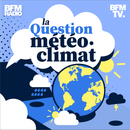When it is very hot and for a long time, organizations are undermined. During the long heat wave it began on June 20 and ended on July 7, one in nine metropolitan was affected by an orange heat wave and almost one in four by red surveillance.
According to a report published on Wednesday, July 9 by Public Health France, emergency consultations for heat -related disorders reached a peak in France on July 1 for all age categories.
These disorders refer to heat blows, hyperthermia, dehydration and hyponatremia, that is, the decrease in salt concentration in the blood, which “sometimes can be the consequence of an excessive water supply compared to sodium (salt) or excess loss in relation to the elimination of water,” explains the Ministry of Health.
This compound indicator, called “Icanicule”, gathers passages and emergency consultations in SOS doctors for symptoms directly linked to heat.
A peak on July 1
On Tuesday, July 1, it was particularly hot in France, with sixteen departments placed in a heat wave. Almost 600 people (569 passages) went to the emergency room for heat -related disorders, or 1.3% of the total emergency activity today.
“Since then, this emergency number has been decreasing to return to personnel prior to the episode,” specifies the public health of France.
On the side of Sos Doctors’s consultations, 284 consultations for Icanicule were observed on July 1 and 262 the next day. The number of consultations on July 1 “approached the maximum number of daily SOS consultations observed during the heat wave of June 2019,” according to Public Health France.
Those over 75 years particularly affected
An age group particularly at risk during heat episodes, elderly patients were the most concerned about emergency passes during the recent heat wave: those over 75 represented more than half of the passages.
“The number of emergency passes for Icanicule of people 75 years old and more reached a peak on July 2 (282 emergency passes) and has been decreasing since then, but slower than younger populations,” says Public Health France.
More than half of these emergency passages were caused by Hyponatremia (57%) and a third were for dehydration (35%). Around three emergency passes of four more than 75 years led to hospitalization.
But the youngest did not save the heat. “The use number of emergency care for Icanicule for people under 15 and 15-44 years has increased until July 1 and then decreases,” said Health France public on Wednesday. These were mainly hyperthermia and heat strokes.
“The passages of the emergency room for Icanicule resulted in hospitalization for 26% of people under 15 and 17% of children aged 15 to 44,” we knew.
A final evaluation in the coming weeks
This first evaluation established by Public Health France gives an idea of the scope of the health effects of a heat wave. “The first impacts of the health observed point out that heat is a health risk, for all age groups, especially because the effects of health can differ in a few days and increase with continuous exposure for several days,” writes the body.
Heat waves are particularly dangerous for the elderly, patients, young children, outdoor workers and any person exposed to high temperatures for long -free periods, especially during the chain of hot nights.
The great territories in southern Europe have experienced successions of “tropical nights”, when temperatures do not fall enough to allow the body to recover.
A study by the Imperial College of London, conducted with the London School of Hygiene and Tropical Medicine and published on Wednesday, also tried for the first time to estimate the number of deaths attributable to this heat wave in 12 European cities and the proportion attributable to climate change.
The study estimates that the heat wave probably caused around 2,300 premature deaths between June 23 and July 2 in these cities. And about 1,500 deaths, about two thirds, would not have taken place without the degrees added by the interruption of the climate by humanity. In fact, according to this study, climate change has made the recent heat wave in Western Europe up to 4 ° C in many cities.
The authorities believe that it will take several weeks to establish a final evaluation of the victims. The succession of similar episodes has already caused tens of thousands of premature deaths in Europe during the previous summers.
The meteorological climate question, its BFMTV podcast
Why are we no longer used to cold? How will our daily life change? Are we lacking water? What is an anticyclone? Every day, our journalists answer their questions about the time that yes and the time it will serve. The weather climate question is a daily BFMTV podcast, which is found on the site and application and on all listening platforms: Apple Podcast, Amazon Music, Deezer or Spotify.
Source: BFM TV


